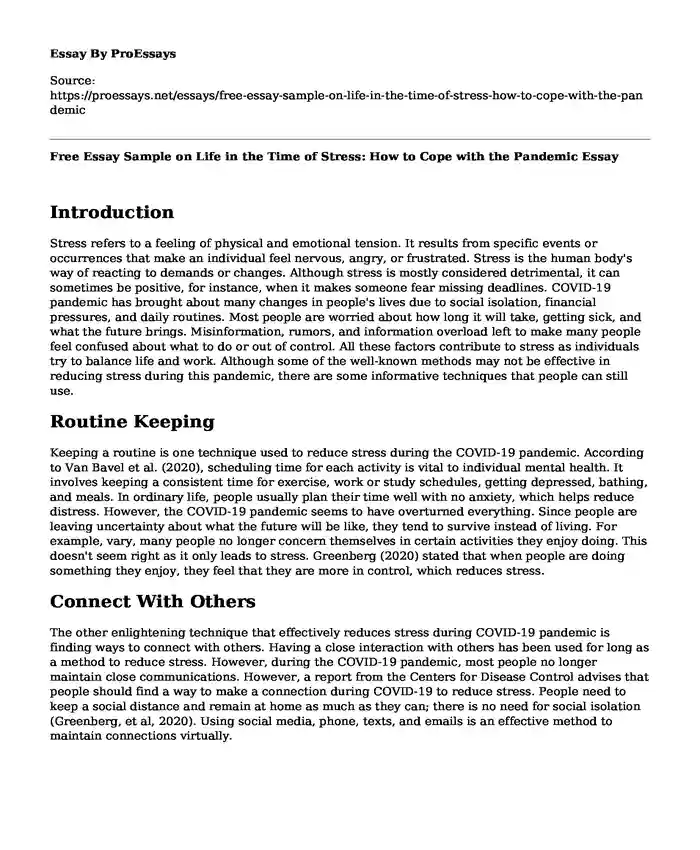Introduction
Stress refers to a feeling of physical and emotional tension. It results from specific events or occurrences that make an individual feel nervous, angry, or frustrated. Stress is the human body's way of reacting to demands or changes. Although stress is mostly considered detrimental, it can sometimes be positive, for instance, when it makes someone fear missing deadlines. COVID-19 pandemic has brought about many changes in people's lives due to social isolation, financial pressures, and daily routines. Most people are worried about how long it will take, getting sick, and what the future brings. Misinformation, rumors, and information overload left to make many people feel confused about what to do or out of control. All these factors contribute to stress as individuals try to balance life and work. Although some of the well-known methods may not be effective in reducing stress during this pandemic, there are some informative techniques that people can still use.
Routine Keeping
Keeping a routine is one technique used to reduce stress during the COVID-19 pandemic. According to Van Bavel et al. (2020), scheduling time for each activity is vital to individual mental health. It involves keeping a consistent time for exercise, work or study schedules, getting depressed, bathing, and meals. In ordinary life, people usually plan their time well with no anxiety, which helps reduce distress. However, the COVID-19 pandemic seems to have overturned everything. Since people are leaving uncertainty about what the future will be like, they tend to survive instead of living. For example, vary, many people no longer concern themselves in certain activities they enjoy doing. This doesn't seem right as it only leads to stress. Greenberg (2020) stated that when people are doing something they enjoy, they feel that they are more in control, which reduces stress.
Connect With Others
The other enlightening technique that effectively reduces stress during COVID-19 pandemic is finding ways to connect with others. Having a close interaction with others has been used for long as a method to reduce stress. However, during the COVID-19 pandemic, most people no longer maintain close communications. However, a report from the Centers for Disease Control advises that people should find a way to make a connection during COVID-19 to reduce stress. People need to keep a social distance and remain at home as much as they can; there is no need for social isolation (Greenberg, et al, 2020). Using social media, phone, texts, and emails is an effective method to maintain connections virtually.
Doing Something for Others
The other informative technique to cope with stress during COVID-19 is doing something for others. Greenberg et al. (2020) argued that people become hopeless and distress when they feel a lack of purpose in their lives. On the contrary, people fill a sense of worth when they feel that they have done something worthwhile. During the COVID-19 pandemic, doing something for others would make an individual feel worthy, which reduces distress. This might include aspects such as supporting the elderly, family members, and neighbors who might be challenged by financial hardship due to COVID-19. Assisting individuals who are affected by the virus and already in quarantine can, through texts and social media, also make an individual feel a sense of worth and reduce stress.
Mental Health
Taking care of the mind is the other crucial technique to reduce stress during COVID-19. As people reflect more on negatives, they tend to become more distressed. To avoid this, interventions that reduce negativities are vital. They include staying busy most of the time to prevent the mind from being overcome with thoughts that result in distress. The CDC also advises people to limit media exposure to avoid false information and ramous and rely only on data released by WHO. Besides, using spiritual life or moral compass can ensure that people focus on positive thoughts (Van Bavel et al., 2020). It helps individuals to remain optimistic, and this, too, reduces stress.
Conclusion
Managing stress during COVID-19 can be challenging. Most mechanisms that had been effective post-Corona virus pandemic might not be practical due to changes such as quarantines, lock-downs, and need to keep social distances as control measures for the disease. However, there are still some informative techniques such as relating to taking care of once mind, virtual connection, and helping others, which are valid during this tough period.
References
Greenberg, N., Docherty, M., Gnanapragasam, S., & Wessely, S. (2020). Managing mental health challenges faced by healthcare workers during the covid-19 pandemic. bmj; 368.
Mayo Clinic Staff. (2020, April 2). COVID-19: How to manage your mental health during the crisis. Mayo Clinic.
https://www.mayoclinic.org/diseases-conditions/coronavirus/in-depth/mental-health-covid-19/art-20482731
Van Bavel, J. J., Baicker, K., Boggio, P. S., Capraro, V., Cichocka, A., Cikara, M., ... & Drury, J. (2020). Using social and behavioral science to support the COVID-19 pandemic response. Nature Human Behaviour, 1-12.
Cite this page
Free Essay Sample on Life in the Time of Stress: How to Cope with the Pandemic. (2023, Oct 17). Retrieved from https://proessays.net/essays/free-essay-sample-on-life-in-the-time-of-stress-how-to-cope-with-the-pandemic
If you are the original author of this essay and no longer wish to have it published on the ProEssays website, please click below to request its removal:
- Defining Structured Diabetes Education
- The Issue of Power in Nursing Leadership Essay
- Research Paper on PCOS: Complex Pathophysiology and Diagnosis
- Essay on Nurse Workforce Shortage: Supporting Seniors' Access to Quality Care
- Eating Disorders: Anorexia, Bulimia, Binge Eating & Body Dysmorphic Disorder - Essay Sample
- Explaining Patient Consent, Rights, and Responsibilities - Essay Sample
- Report Example on Barcode Medication Administration







